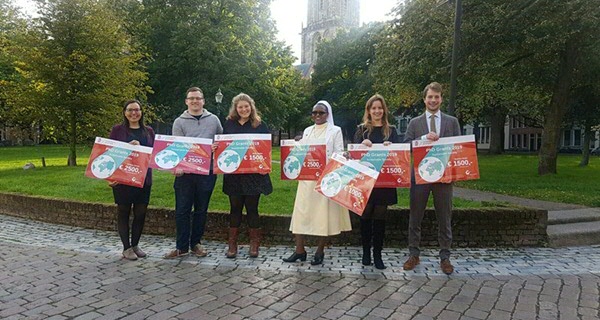Campus Fryslân promovendi onder finalisten RUG Sustainable Society PhD
Van de tien finalisten van de Rijksuniversiteit Groningen Sustainable Society PhD Grant, zijn er twee promovendi bij Campus Fryslân: Manon Eikelenboom en Jesse van Amelsvoort. Beide promovendi wonnen een beurs van € 1500,-.
Om jonge onderzoekers te stimuleren om aan maatschappelijke uitdagingen te werken, bood de Rijksuniversiteit Groningen promovendi de gelegenheid om hun onderzoeksvoorstel in te dienen voor een Europese of Intercontinentale beurs tot € 2500,-. De jury heeft de voorstellen gehonoreerd, die nauw aansluiten bij het thema duurzame samenleving, die de meest expliciete bijdrage toonden aan maatschappelijke uitdagingen en waar de subsidie het grootste verschil kon maken voor het project of de aanvrager. Van de meer dan 50 aanvragen verleende de jury de beurs aan 10 finalisten, waaronder Eikelenboom en Van Amelsvoort.

Manon Eikelenboom
Circular economy - European grant
‘’The circular economy (CE) is a system that replaces the end-of-life concept with the reduction and reuse of materials in production and consumption. The CE literature has been technologically and ecologically focused, neglecting the social dimension. This is an important limitation as the CE can create or destroy social value. Furthermore, community perspectives are important for the success of the CE which requires behavioral change. My research investigates the social dimension through cooperation with social housing associations. These associations provide low income communities with affordable housing and improve their well-being. Housing association activities can cause negative environmental impacts which can be reduced through circular approaches. It is important that these approaches assist in improving the well-being of communities and do not lead to negative implications. My research explores the perspectives of communities towards circular approaches and new ways of involving communities in their design. This helps create circular approaches that achieve ecological benefits (SDG 12, e.g. efficient waste collection) and community goals (SDG 11, e.g. clean neighborhoods).
Circular approaches are often disintegrated from communities. This is a limitation as circular approaches can assist low income communities, for example via the reuse of furniture. To collect information on circularity in the community and create enthusiasm, I am highly motivated to organize a workshop with a local primary school. The students will learn about circularity and create documentaries about circularity in their neighborhood, interviewing other community members. These documentaries will be used to start conversations with tenants and inspire circular projects in the neighborhood.’’
Jesse van Amelsvoort
Linguistic Minorirty - European grant
‘’My research contributes to solutions for the socetial challenges relating to diversity and cultural cohesion in multilingual Europe. I do this by focusing on the work of contemporary migrant and autochthonous minority writers, and the way they engage discussions about these topics. Sustainable societies, here, refers not to economic factors, but rather to a place where human diversity is not a threat, but a resource to deal with matters of a common concern. The work of authors such as Zadie Smith, Tsjêbbe Hettinga and Emine Sevgi Özdamar offers inroads into thinking about these issues in a new way that bypasses established oppositions between newcomers and autochthones, those who belong and those who do not. These authors include in their work voices that usually remain unheard and show how we can rethink categories such as language, community and identity that are central to many societal discussions in the Western world in the past three decades. Together with this funding, my research, performed in an interdisciplinary faculty explicitly dedicated to addressing societal challenges, positions my work in the humanities to deliver a significant social impact.
The grant will help me fund a fellowship at Stockholm University’s Department of Slavic and Baltic Studies, Finnish, Dutch and German, and its English department. Researchers here have a strong research focus on multilingualism and world literature. My hosts will be Prof Stefan Helgesson, PI in a large-scale research project on language dynamics in world literature, Dr Markus Huss and Dr Heidi Grönstrand, editors of The Aesthetics and Politics of Linguistic Borders (Routledge, 2019). I will participate in research activities, discuss with colleagues and perhaps participate in teaching.’’
